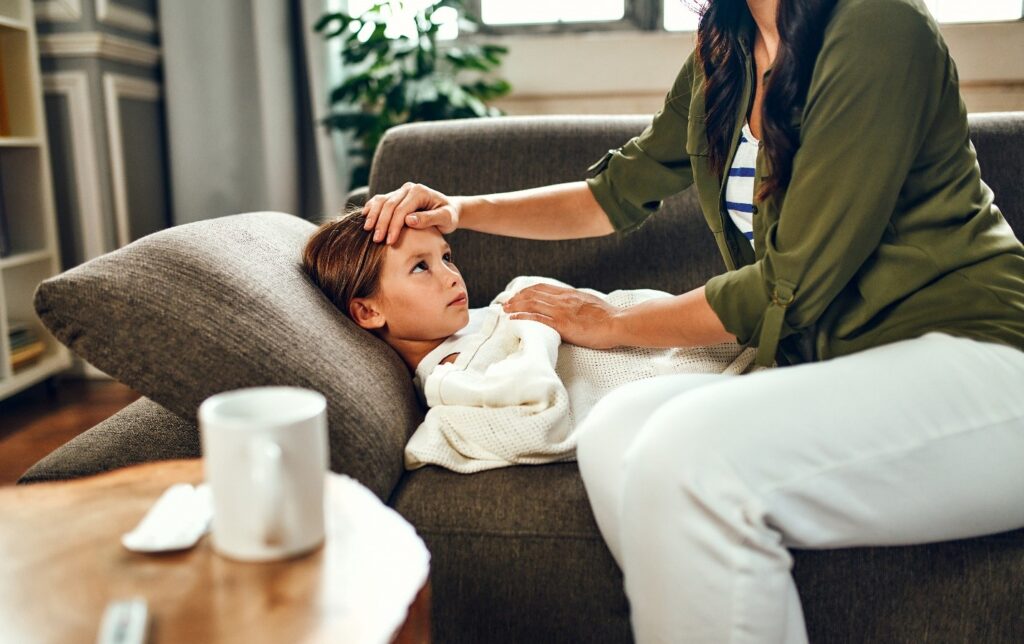Imagine babysitting a vibrant four-year-old who just finished playing outdoors. As they excitedly grab a snack, you notice dirt-covered hands heading toward their mouth. It’s a scenario many parents and babysitters encounter—a seemingly harmless moment that can introduce germs and cause illnesses. Protecting children from common illnesses may seem daunting, but with proactive measures, you can significantly reduce their risks. Here are the top ten practical ways to safeguard children’s health and happiness.
Maintain Proper Hygiene Practices
Good hygiene is the cornerstone of preventing illnesses in children. Frequent handwashing with soap and water is essential, especially before meals and after bathroom visits. Teaching children to cover their mouths with their elbow while sneezing or coughing helps contain germs. Keeping a child-safe hand sanitizer handy for situations where soap isn’t available is also a wise choice.
These practices can prevent illnesses like colds, flu, and stomach infections. Encouraging children to make hygiene a habit ensures their health and safety both at home and in public spaces.
Keep Vaccinations Up-to-Date
Vaccinations are a vital shield against severe diseases like measles, whooping cough, and polio. Parents should consult a pediatrician to ensure their child’s immunization schedule is up-to-date. Missing vaccinations could leave children vulnerable to preventable illnesses that can have long-term health implications.
According to the World Health Organization (WHO), vaccines save 2-3 million lives annually, emphasizing their significance in safeguarding public health.
Promote a Healthy Diet
A nutritious diet fuels a child’s growing body and strengthens their immune system. Parents should include plenty of fruits, vegetables, whole grains, and lean proteins in their meals while limiting sugary snacks and beverages. Foods like citrus fruits, spinach, and yogurt are particularly effective at boosting immunity.
Encouraging children to make healthy food choices early in life not only reduces their risk of illnesses but also establishes lifelong healthy eating habits.
Ensure Adequate Sleep
Sleep is essential for children’s physical and mental development. Their growing bodies require more rest than adults, with babies needing up to 17 hours a day and young children requiring 10-14 hours. A consistent bedtime routine—such as reading a story or dimming lights—can help them settle into restful sleep.
Sufficient sleep strengthens the immune system, enabling the body to fight off infections more effectively.

Teach Sharing Boundaries
While sharing is a valuable social skill, some items should remain personal to prevent the spread of germs. Teach children not to share water bottles, eating utensils, or personal items like hairbrushes and towels.
During cold and flu season, this small adjustment can significantly reduce the transmission of illnesses in settings like schools and playgrounds.
Keep Sick Children at Home
When children are unwell, it’s important to minimize their interaction with others. Symptoms like fever, persistent cough, or fatigue could indicate contagious illnesses. Babysitters and caregivers should inform parents if they notice any signs of sickness.
Keeping sick children at home prevents germs from spreading to other children, ensuring a safer environment for all.
Regularly Disinfect Toys and Surfaces
Toys, play areas, and commonly touched surfaces are hotspots for germs. Parents and babysitters should clean these items regularly with child-safe disinfectants. For soft toys, washing them in warm water is recommended.
This practice minimizes the spread of bacteria and viruses, creating a healthier space for children to explore and play.
Encourage Physical Activity
Exercise not only keeps children active but also enhances their immune systems. Activities like running, cycling, or yoga can be enjoyable ways to keep kids physically engaged.
Incorporating at least 60 minutes of physical activity into a child’s daily routine improves overall health and reduces the likelihood of developing chronic illnesses later in life.
Stay Hydrated
Proper hydration plays a crucial role in maintaining energy levels and flushing out toxins from the body. Encourage children to drink water throughout the day and avoid sugary drinks, which can weaken the immune system.
Keeping a colorful, child-friendly water bottle handy can make drinking water more appealing to kids.
Consult a Doctor for Persistent Symptoms
When a child exhibits concerning symptoms like high fever, rashes, or prolonged cough, timely medical attention is essential. Babysitters and caregivers should promptly communicate such issues to parents.
Seeking professional help ensures that minor symptoms don’t escalate into severe health problems.
Why are children more prone to illnesses?
Children’s immune systems are still developing, making them more susceptible to infections. Exposure to new environments like schools or daycare increases their chances of encountering germs.
How often should children wash their hands?
Children should wash their hands frequently—before eating, after using the restroom, and after playing outside—to reduce the risk of infections.
Are vaccines necessary for all children?
Yes, vaccines are essential for protecting children against life-threatening diseases. They are a critical component of preventive healthcare.
What foods help boost a child’s immunity?
Foods rich in vitamins and minerals, such as oranges, broccoli, and yogurt, are excellent for boosting immunity. Limiting processed and sugary foods is equally important.

What should babysitters do if a child shows symptoms of illness?
Babysitters should notify the parents immediately and isolate the child from others to prevent the spread of germs.
How can toys and surfaces be kept germ-free?
Regularly clean and disinfect toys and commonly touched surfaces using child-safe cleaning products.
Is exercise really necessary for young children?
Yes, physical activity boosts immunity, strengthens muscles, and supports overall health, making it an essential part of a child’s daily routine.
How does hydration help prevent illnesses?
Staying hydrated helps flush out toxins, maintain energy, and support the immune system, reducing the likelihood of infections.
How Call Doctor Helps Safeguard Children’s Health
At Call Doctor, we specialize in providing convenient and reliable pediatric care to keep your children healthy. Our services include:
- At-home medical consultations for quick and comfortable treatment.
- Vaccination services to keep your child’s immunization schedule on track.
- Expert guidance on managing symptoms and preventing illnesses.
With Call Doctor, you can ensure your child’s health without leaving the comfort of home.
Take Action Today!
Trust Call Doctor to help your little ones stay healthy and happy. Contact us now for professional babysitting services in Dubai.
“Your child’s health, our responsibility.”




